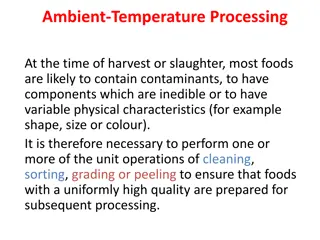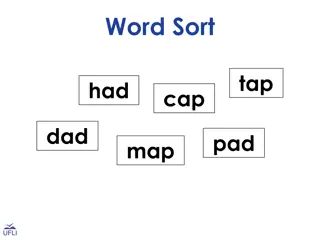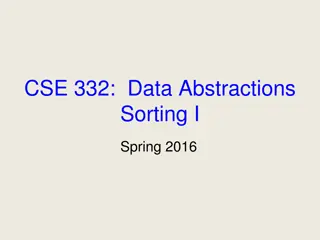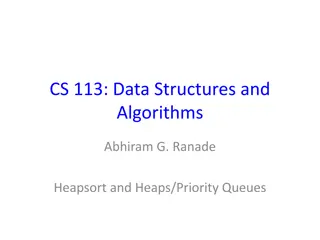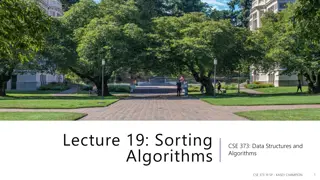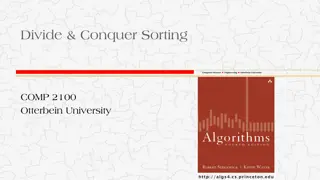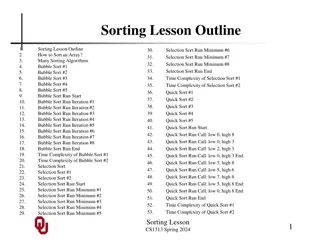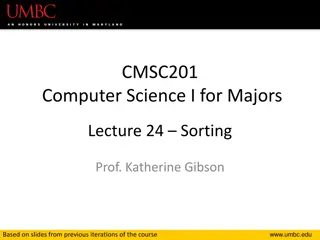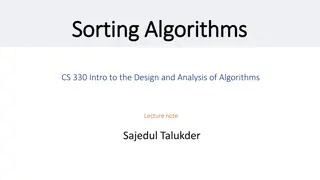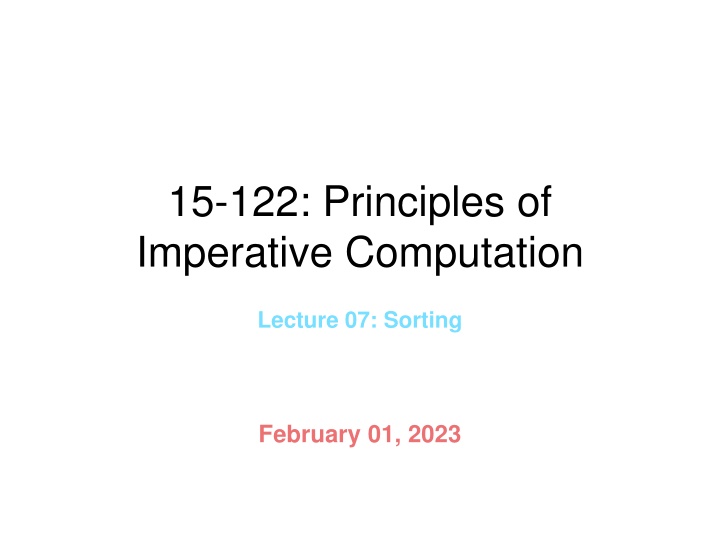
Sorting Algorithms: Divide and Conquer Concepts
Explore the concepts of Divide and Conquer in sorting algorithms, including selection sort, merge sort, quick sort, and stable sorting. Learn about the benefits of dividing problems and combining results efficiently. Discover the linear search and binary search techniques for searching arrays and their respective complexities. Programming assignment 3 due today by 9:00 PM.
Download Presentation

Please find below an Image/Link to download the presentation.
The content on the website is provided AS IS for your information and personal use only. It may not be sold, licensed, or shared on other websites without obtaining consent from the author. If you encounter any issues during the download, it is possible that the publisher has removed the file from their server.
You are allowed to download the files provided on this website for personal or commercial use, subject to the condition that they are used lawfully. All files are the property of their respective owners.
The content on the website is provided AS IS for your information and personal use only. It may not be sold, licensed, or shared on other websites without obtaining consent from the author.
E N D
Presentation Transcript
15-122: Principles of Imperative Computation Lecture 07: Sorting February 01, 2023
Today Last lecture: Binary search Algorithm, implementation, safety and correctness proofs, and the logarithmic advantage Today s lecture: Sorting Divide & conquer, selection sort, merge sort, quick sort & stable sorting Announcement: Programming assignment 3 is due today by 9:00PM 1
Searching an n-element Array Linear Search Binary Search Check an element If not found, search an (n-1) element array Check an element If not found, search an (n/2) element array log n n Huge benefit by dividing the problem (in half) O(n)O(log n) 3
Sorting an n-element Array Can we do the same for sorting an array? We can work on: o The full problem o Or parts of the problem (e.g., twohalves) and combine results Divide & Conquer Na ve 4
Sorting an n-element Array Na ve algorithm Divide and Conquer algorithm Linear search Binary search Searching O(n) O(log n) ??? Sort ??? sort Sorting O(??) O(??) 5
Sorting an Array Reorder the elements to put them in increasing order o Duplicate elements are allowed 0 1 2 3 4 5 6 7 A: 9 13 18 3 13 5 7 6 0 1 2 3 4 5 6 7 A: 3 5 6 7 9 13 13 18 There are many algorithms to sort arrays o Let us start with a simple one, namely, selection sort 7
Selection Sort 0 0 1 1 2 2 3 3 4 4 5 5 6 6 7 7 Find element that shall go in A[0] o Smallest element in A[0, n) A: 9 9 13 13 18 18 3 3 13 13 5 5 7 7 6 6 0 1 2 3 4 5 6 7 Swap it with A[0] A: 13 18 13 5 7 6 3 9 0 1 2 3 4 5 6 7 Find element that shall go in A[1] o Smallest element in A[1, n) A: 3 18 9 13 5 7 6 13 0 1 2 3 4 5 6 7 Swap it with A[1] A: 3 18 9 13 7 6 5 13 carry on 0 1 2 3 4 5 6 7 Stop when A is entirely sorted A: 3 5 6 7 9 13 13 18 8
Selection Sort We need two operations: o Find the minimum of an array segment A[lo, hi) & return its index A[lo,hi)can t be empty int find_min(int[] A, int lo, int hi) //@requires 0 <= lo && lo < hi && hi <= \length(A); /*@ensures lo <= \result && \result < hi && le_seg(A[\result], A, lo, hi); @*/ ; That s A[\result] A[lo, hi) o Swap two elements of an array (given their indices) // swaps A[i] and A[j]; all other elements are unchanged void swap(int[] A, int i, int j) //@requires 0 <= i && i < \length(A); //@requires 0 <= j && j < \length(A); returns no value swap modifies input array 9
Selection Sort Let s capture our intuition about how it works in code o Generalization: sort array segment A[lo, hi) A[lo,hi)can be empty sort modifies input array void sort(int[] A, int lo, int hi) //@requires 0 <= lo && lo <= hi && hi <= \length(A); //@ensures is_sorted(A, lo, hi); { for (int i = lo; i < hi; i++) { int min = find_min(A, i, hi); swap(A, i, min); } } 10
Cost of Selection Sort find_min(A, lo, hi) Finds the minimum of an array segment A[lo, hi) and returns its index o It scans the entire segment once Cost: O(hi lo) o Note that it makes hi - lo - 1comparisons The number of comparisons is a convenient proxy for our unit of cost int find_min(int[] A, int lo, int hi) { int mini = lo; for (int i = lo+1; i < hi; i++) { if (A[i] < A[mini]) mini = i; } return mini; } Contracts omitted void swap(int[] A, int i, int j) { int tmp = A[i]; A[i] = A[j]; A[j] = tmp; } swap(A, i, j) o Simply swaps values at two indices Cost: O(1) Contracts omitted 11
void sort(int[] A, int lo, int hi) { for (int i = lo; i < hi; i++) { int min = find_min(A, i, hi); swap(A, i, min); } } Cost of Selection Sort Assume array segment A[lo, hi) has length n The loop runs n time At each iteration, o Call find_min on segment of length j = hi - i It makes j-1 comparisons j ranges over 1, , n o Call swap It makes no comparisons Contracts omitted Number of comparisons to sort an n-element array segment Carl Friedrich Gauss came up with this formula when he was 9 years old O(n2) (n-1) + + 0 = j=0n-1 j = n(n-1)/2 Selection Sort Cost:O(n2) 12
Selection Sort Is this code safe and correct? void sort(int[] A, int lo, int hi) //@requires 0 <= lo && lo <= hi && hi <= \length(A); //@ensures is_sorted(A, lo, hi); { for (int i = lo; i < hi; i++) { int min = find_min(A, i, hi); swap(A, i, min); } } Selection Sort Cost:O(n2) 13
Sorting an n-element Array Na ve algorithm Divide and Conquer algorithm Linear search Binary search Searching O(n) O(log n) Selection Sort ??? sort Sorting O(n2) O(??) 24
Using Selection Sort lo hi A: Selection sort lo hi A: SORTED If hi - lo = n The length of array segment A[lo, hi) o Cost is O(n2) o Let s say n2 But (n/2)2 = n2/4 o What if we sort the two halves of the array? 26
Using Selection Sort Cleverly (n/2)2 + (n/2)2 = n2/4 + n2/4 = n2/2 lo mid hi A: Selection sort on each half lo mid hi A: SORTED SORTED o Sorting each half costs n2/4 o Altogether costs n2/2 o That is a saving of half over using selection sort on the whole array! But the overall array is not sorted o If we can turn two sorted halves into a sorted whole for less than n2/2, we are doing better than plain selection sort 27
Using Selection Sort Cleverly lo mid hi Costs about n2/2 A: Selection sort on each half lo mid hi A: Costs hopefully less than n2/2 SORTED SORTED Merge lo hi A: SORTED Merge: Turns two sorted half arrays into a sorted array o (cheaply) 28
Implementation Computing mid We learned this from binary search void sort(int[] A, int lo, int hi) //@requires 0 <= lo && lo <= hi && hi <= \length(A); //@ensures is_sorted(A, lo, hi); { int mid = lo + (hi - lo) / 2; //@assert lo <= mid && mid <= hi; // call selection sort on each half // merge the two halves } If hi == lo, then mid == hi This was not possible in the code for binary search lo mid hi A: 29
void selection_sort(int[] A, int lo, int hi) //@requires 0 <= lo && lo <= hi && hi <= \length(A); //@ensures is_sorted(A, lo, hi); Implementation Calling selection_sort on each half 1. void sort(int[] A, int lo, int hi) 2. //@requires 0 <= lo && lo <= hi && hi <= \length(A); 3. //@ensures is_sorted(A, lo, hi); 4. { 5. int mid = lo + (hi - lo) / 2; 6. //@assert lo <= mid && mid <= hi; 7. selection_sort(A, lo, mid); 8. selection_sort(A, mid, hi); 9.// merge the two halves 10.} To show: 0 lo mid \length(A) 0 lo lo mid mid hi hi \length(A) mid \length(A) by math by line 2 by line 6 by line 6 by line 2 To show: 0 mid hi \length(A) Left as exercise Is this code safe so far? Since selection_sort is correct, its postcondition holds A[lo, mid) sorted A[mid, hi) sorted lo lo mid mid hi hi A: SORTED SORTED 30
void selection_sort(int[] A, int lo, int hi) //@requires 0 <= lo && lo <= hi && hi <= \length(A); //@ensures is_sorted(A, lo, hi); Implementation Calling selection_sort on each half void sort(int[] A, int lo, int hi) //@requires 0 <= lo && lo <= hi && hi <= \length(A); //@ensures is_sorted(A, lo, hi); { int mid = lo + (hi - lo) / 2; //@assert lo <= mid && mid <= hi; selection_sort(A, lo, mid); //@assert is_sorted(A, lo, mid); selection_sort(A, mid, hi); //@assert is_sorted(A, mid, hi); // merge the two halves } We are left with implementing merge 31
Implementation lo mid hi A: Selection sort on each half lo mid hi Turns two A: SORTED SORTED sorted array segments into a single sorted array segment Merge lo hi A: SORTED Assume we have an implementation void merge(int[] A, int lo, int mid, int hi) //@requires 0 <= lo && lo <= mid && mid <= hi && hi <= \length(A); //@requires is_sorted(A, lo, mid) && is_sorted(A, mid, hi); //@ensures is_sorted(A, lo, hi); 32
void selection_sort(int[] A, int lo, int hi) //@requires 0 <= lo && lo <= hi && hi <= \length(A); //@ensures is_sorted(A, lo, hi); Implementation void merge(int[] A, int lo, int mid, int hi) //@requires 0 <= lo && lo <= mid && mid <= hi && hi <= \length(A); //@requires is_sorted(A, lo, mid) && is_sorted(A, mid, hi); //@ensures is_sorted(A, lo, hi); void sort(int[] A, int lo, int hi) //@requires 0 <= lo && lo <= hi && hi <= \length(A); //@ensures is_sorted(A, lo, hi); { int mid = lo + (hi - lo) / 2; //@assert lo <= mid && mid <= hi; selection_sort(A, lo, mid); //@assert is_sorted(A, lo, mid); selection_sort(A, mid, hi); //@assert is_sorted(A, mid, hi); merge(A, lo, mid, hi); } To show: 0 lo mid hi \length(A) Left as exercise To show: A[lo, mid) sorted and A[mid, hi) sorted by the postconditions of selection_sort Is this code safe? If merge is correct, its postcondition holds A[lo, hi) sorted lo hi A: SORTED 33
void selection_sort(int[] A, int lo, int hi) //@requires 0 <= lo && lo <= hi && hi <= \length(A); //@ensures is_sorted(A, lo, hi); Implementation void merge(int[] A, int lo, int mid, int hi) //@requires 0 <= lo && lo <= mid && mid <= hi && hi <= \length(A); //@requires is_sorted(A, lo, mid) && is_sorted(A, mid, hi); //@ensures is_sorted(A, lo, hi); void sort(int[] A, int lo, int hi) //@requires 0 <= lo && lo <= hi && hi <= \length(A); //@ensures is_sorted(A, lo, hi); { int mid = lo + (hi - lo) / 2; //@assert lo <= mid && mid <= hi; selection_sort(A, lo, mid); //@assert is_sorted(A, lo, mid); selection_sort(A, mid, hi); //@assert is_sorted(A, mid, hi); merge(A, lo, mid, hi); //@assert is_sorted(A, lo, hi); } A[lo, hi) sorted is the postcondition of sort o sort is correct lo hi A: SORTED 34
Implementation lo mid hi A: Selection sort on each half lo mid hi A: SORTED SORTED Merge lo hi A: SORTED But how does merge work? 35
merge lo mid hi A: SORTED SORTED TMP: SORTED Scan the two half array segments from left to right At each step, copy the smaller element in a temporary array At the end, copy the temporary array back into A[lo, hi) 36
Example merge lo mid hi A: TMP: 2 3 6 7 2 2 5 2 lo mid hi TMP: A: 2 3 6 7 2 2 5 2 2 lo mid hi A: TMP: 3 3 6 7 2 2 5 2 2 3 lo mid hi A: TMP: 5 3 6 7 2 2 5 2 2 3 5 lo mid hi A: TMP: 6 3 6 7 2 2 5 2 2 3 5 6 lo mid hi TMP: A: 7 3 6 7 2 2 5 2 2 3 5 6 7 lo hi A: TMP: 2 2 3 5 6 7 2 2 3 5 6 7 37
merge lo mid hi A: SORTED SORTED TMP: SORTED Cost of merge? o If A[lo, hi) has n elements, o We copy one element to TMP at each step n steps o We copy all n elements back to A at the end O(n) That s cheaper then n2/2 38
In-place Code that uses at most a constant amount of temporary storage are called in-place For example This is a constant amount of storage because it takes a fixed amount of space, regardless of what n is void f(int[] A, int n) { int a = 8*n; bool b = false; char[] c = alloc_array(char, 2*n); string[] d = alloc_array(string, 10); int[] e = A; } This is not a constant amount of storage because the length of c depends on the value of the parameter n This is a constant amount of storage because the length of d does not depend on n This is a constant amount of storage because e is just an alias to A So f is not in-place 39
merge lo mid hi A: SORTED SORTED TMP: SORTED Algorithms that use at most a constant amount of temporary storage are called in-place merge uses lots of temporary storage o array TMP -- same size as A[lo, hi) o merge is not in-place In-place algorithms for merge are more expensive 40
Using Selection Sort Cleverly lo mid hi Costs about n2/2 A: Selection sort on each half lo mid hi A: Costs about n SORTED SORTED Merge lo hi A: SORTED The overall cost is about n2/2 + n o Better than plain selection sort n2 o But still O(n2) 41
Mergesort 42
void selection_sort(int[] A, int lo, int hi) //@requires 0 <= lo && lo <= hi && hi <= \length(A); //@ensures is_sorted(A, lo, hi); Reflection void sort(int[] A, int lo, int hi) //@requires 0 <= lo && lo <= hi && hi <= \length(A); //@ensures is_sorted(A, lo, hi); { int mid = lo + (hi - lo) / 2; //@assert lo <= mid && mid <= hi; selection_sort(A, lo, mid);//@assert is_sorted(A, lo, mid); selection_sort(A, mid, hi);//@assert is_sorted(A, mid, hi); merge(A, lo, mid, hi); //@assert is_sorted(A, lo, hi) } selection_sort and sort are interchangeable o They solve the same problem sorting an array segment o They have the same contracts o Both are correct 43
void selection_sort(int[] A, int lo, int hi) //@requires 0 <= lo && lo <= hi && hi <= \length(A); //@ensures is_sorted(A, lo, hi); A Recursive sort void sort(int[] A, int lo, int hi) //@requires 0 <= lo && lo <= hi && hi <= \length(A); //@ensures is_sorted(A, lo, hi); { int mid = lo + (hi - lo) / 2; //@assert lo <= mid && mid <= hi; sort(A, lo, mid); //@assert is_sorted(A, lo, mid); sort(A, mid, hi); //@assert is_sorted(A, mid, hi); merge(A, lo, mid, hi); //@assert is_sorted(A, lo, hi); } Replace the calls to selection_sort with recursive calls to sort o Same preconditions: calls to sort are safe o Same postconditions: can only return sorted array segments o Nothing changes for merge merge returns a sorted array segment sort cannot compute the wrong result 44
A Recursive sort void sort(int[] A, int lo, int hi) //@requires 0 <= lo && lo <= hi && hi <= \length(A); //@ensures is_sorted(A, lo, hi); { int mid = lo + (hi - lo) / 2; //@assert lo <= mid && mid <= hi; sort(A, lo, mid); //@assert is_sorted(A, lo, mid); sort(A, mid, hi); //@assert is_sorted(A, mid, hi); merge(A, lo, mid, hi); //@assert is_sorted(A, lo, hi); } Is sort correct? o It cannot compute the wrong result o But will it compute the right result? This is a recursive function o But no base case! 45
A Recursive sort What if hi == lo? o mid == lo o Recursive calls with identical arguments Infinite loop!! What to do? o A[lo,lo) is the empty array o Always sorted! o Simply return void sort(int[] A, int lo, int hi) //@requires 0 <= lo && lo <= hi && hi <= \length(A); //@ensures is_sorted(A, lo, hi); { int mid = lo + (hi - lo) / 2; //@assert lo <= mid && mid <= hi; sort(A, lo, mid); //@assert is_sorted(A, lo, mid); sort(A, mid, hi); //@assert is_sorted(A, mid, hi); merge(A, lo, mid, hi); //@assert is_sorted(A, lo, hi); } 46
A Recursive sort What if hi == lo? o mid == lo o Recursive calls with identical arguments Infinite loop!! What to do? o A[lo,lo) is the empty array o Always sorted! o Simply return void sort(int[] A, int lo, int hi) //@requires 0 <= lo && lo <= hi && hi <= \length(A); //@ensures is_sorted(A, lo, hi); { if (hi == lo) return; mid == hi now impossible int mid = lo + (hi - lo) / 2; //@assert lo <= mid && mid < hi; sort(A, lo, mid); //@assert is_sorted(A, lo, mid); sort(A, mid, hi); //@assert is_sorted(A, mid, hi); merge(A, lo, mid, hi); //@assert is_sorted(A, lo, hi); } 47
A Recursive sort What if hi == lo+1? o mid == lo, still o First recursive call: sort(A, lo, lo) Handled by the new base case o Second recursive call: sort(A, lo, hi) Infinite loop!! void sort(int[] A, int lo, int hi) //@requires 0 <= lo && lo <= hi && hi <= \length(A); //@ensures is_sorted(A, lo, hi); { if (hi == lo) return; What to do? o A[lo,lo+1) is a 1-element array o Always sorted! o Simply return! int mid = lo + (hi - lo) / 2; //@assert lo <= mid && mid < hi; sort(A, lo, mid); //@assert is_sorted(A, lo, mid); sort(A, mid, hi); //@assert is_sorted(A, mid, hi); merge(A, lo, mid, hi); //@assert is_sorted(A, lo, hi); } 48
A Recursive sort What if hi == lo+1? o mid == lo, still o First recursive call: sort(A, lo, lo) Handled by the new base case o Second recursive call: sort(A, lo, hi) Infinite loop!! void sort(int[] A, int lo, int hi) //@requires 0 <= lo && lo <= hi && hi <= \length(A); //@ensures is_sorted(A, lo, hi); { if (hi == lo) return; if (hi == lo+1) return; What to do? o A[lo,lo+1) is a 1-element array o Always sorted! o Simply return! mid == lo also impossible int mid = lo + (hi - lo) / 2; //@assert lo < mid && mid < hi; sort(A, lo, mid); //@assert is_sorted(A, lo, mid); sort(A, mid, hi); //@assert is_sorted(A, mid, hi); merge(A, lo, mid, hi); //@assert is_sorted(A, lo, hi); } 49
A Recursive sort No more opportunities for infinite loops The preconditions still imply the postconditions o Base case return: arrays of lengths 0 and 1 are always sorted o Final return: our original proof applies void sort(int[] A, int lo, int hi) //@requires 0 <= lo && lo <= hi && hi <= \length(A); //@ensures is_sorted(A, lo, hi); { if (hi == lo) return; if (hi == lo+1) return; sort is correct! int mid = lo + (hi - lo) / 2; //@assert lo < mid && mid < hi; sort(A, lo, mid); //@assert is_sorted(A, lo, mid); sort(A, mid, hi); //@assert is_sorted(A, mid, hi); merge(A, lo, mid, hi); //@assert is_sorted(A, lo, hi); } 50
A Recursive sort No more opportunities for infinite loops The preconditions still imply the postconditions o Base case return: arrays of lengths 0 and 1 are always sorted o Final return: our original proof applies sort is correct! void sort(int[] A, int lo, int hi) //@requires 0 <= lo && lo <= hi && hi <= \length(A); //@ensures is_sorted(A, lo, hi); { if (hi - lo <= 1) return; This function is called mergesort minor clean-up int mid = lo + (hi - lo) / 2; //@assert lo <= mid && mid <= hi; sort(A, lo, mid); //@assert is_sorted(A, lo, mid); sort(A, mid, hi); //@assert is_sorted(A, mid, hi); merge(A, lo, mid, hi); //@assert is_sorted(A, lo, hi); } 51
A Recursive sort Recursive functions don t have loop invariants How does our correctness methodology transfer? o INIT: Safety of the initial call to the function o PRES: From the preconditions to the safety of the recursive calls o EXIT: From the postconditions of the recursive calls to the postcondition of the function o TERM: The base case handles input smaller than some bound The input of each recursive call is strictly smaller than the input of the function 52
void merge(int[] A, int lo, int mid, int hi) //@requires 0 <= lo && lo <= mid && mid <= hi && hi <= \length(A); //@requires is_sorted(A, lo, mid) && is_sorted(A, mid, hi); //@ensures is_sorted(A, lo, hi); Mergesort void mergesort(int[] A, int lo, int hi) //@requires 0 <= lo && lo <= hi && hi <= \length(A); //@ensures is_sorted(A, lo, hi); { if (hi - lo <= 1) return; int mid = lo + (hi - lo) / 2; //@assert lo < mid && mid < hi; mergesort(A, lo, mid); mergesort(A, mid, hi); merge(A, lo, mid, hi); } 53
void mergesort(int[] A, int lo, int hi) { if (hi - lo <= 1) return; // O(1) int mid = lo + (hi - lo) / 2;// O(1) mergesort(A, lo, mid); mergesort(A, mid, hi); merge(A, lo, mid, hi); // O(n) } Complexity of Mergesort Work done by each call to mergesort (ignoring recursive calls) o Base case: constant cost -- O(1) o Recursive case: Compute mid: constant cost -- O(1) Recursive calls: (ignored) merge: linear cost -- O(n) n = hi - lo We need to add this for all recursive calls o It is convenient to organize them by level 54
void mergesort(int[] A, int lo, int hi) { if (hi - lo <= 1) return; // O(1) int mid = lo + (hi - lo) / 2;// O(1) mergesort(A, lo, mid); mergesort(A, mid, hi); merge(A, lo, mid, hi); // O(n) } Complexity of Mergesort level calls to mergesort calls to merge cost of each call cost at this level 1 n 1 1 n n 2 n/2 n/2 2 2 n/2 n n/4 n/4 n/4 n/4 3 4 4 n/4 n n/2 n 1 n log n 1 1 1 1 1 1 1 1 1 1 1 1 1 1 1 1 Total cost: n log n At each level, we split array in half; can be done only log n times base case O(n log n) 55
Comparing Sorting Algorithms Selection sort and mergesort solve the same problem o Mergesort is asymptotically faster: O(n log n) vs. O(n2) Mergesort is preferable if speed for large inputs is all that matters o Selection sort is in-place but mergesort is not Selection sort may be preferable if space is very tight Choosing an algorithm involves several parameters o It depends on the application Summary: Selection sort Mergesort Worst-case complexity O(n2) O(n log n) Yes No In-place? 56
Quicksort 57
void mergesort(int[] A, int lo, int hi) { if (hi - lo <= 1) return; int mid = lo + (hi - lo) / 2; mergesort(A, lo, mid); mergesort(A, mid, hi); merge(A, lo, mid, hi); } Reflections lo hi A: Finding mid almost no cost O(1) Prep work lo mid hi A: Recursive calls lo mid hi merge A: SORTED SORTED some real cost O(n) Final touch lo hi A: SORTED 58
Reflections Can we do it the other way around? lo hi A: Prep work lo p hi Some real cost hopefully O(n) A: Recursive calls lo p hi almost no cost O(1) A: SORTED SORTED A[lo, p) A[p, hi) Final touch What if we arrange so that A[lo,p) A[p,hi)? lo hi A: No final touch needed! SORTED 59


